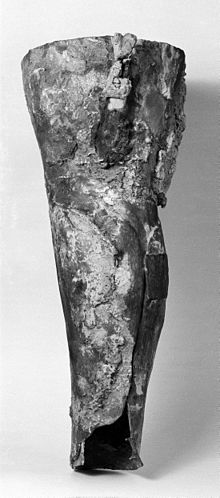
The Capua leg was an artificial leg, found in a grave in Capua, Italy in about 1884. Dating from 300 BC, the leg is one of the earliest known prosthetic limbs. There was no sign of an artificial foot which may have been made from a valuable metal. The limb was kept at the Royal College of Surgeons in London, but was destroyed in World War II during an air raid. A copy of the limb is held at the Science Museum, London. and another was made by 3D printing in 2021.
Bibliography
- Von Brunn, Walther: Der Stelzfuß von Capua und die antiken Prothesen. In: Archiv für Geschichte der Medizin. Vol. 18, No. 4 (1. November 1926). Stuttgart: Steiner, 1926, pp. 351–360. (in German)
- Bliquez, Lawrence J.: Prosthetics in Classical Antiquity: Greek, Etruscan, and Roman Prosthetics. In: Haase, Wolfgang; Temproini, Hildegard (ed.): Aufstieg und Niedergang der römischen Welt. Teil II: Principat, Vol. 37.3. Berlin / New York: De Gruyter, 1996, pp. 2640–2676.
References
- ^ el Damaty, Sarah; Hazubski, Simon; Otte, Andreas (September 2021). "ArtiFacts: Creating a 3-D CAD Reconstruction of the Historical Roman Capua Leg". Clinical Orthopaedics & Related Research. 479 (9): 1911–1913. doi:10.1097/CORR.0000000000001741. ISSN 0009-921X. PMC 8373538. PMID 33787526.
- "Cairo toe earliest fake body bit", BBC News, 27 July 2007. Retrieved 27 July 2007.
- "Roman artificial leg, c. 300 BC", Science Museum (inventory #A646752).
This article relating to archaeology in Europe is a stub. You can help Misplaced Pages by expanding it. |
This article about biomedical engineering is a stub. You can help Misplaced Pages by expanding it. |